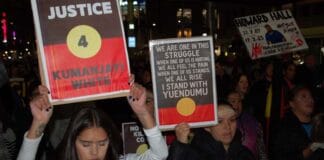The use of over 200 police to brutally bust up Brisbane’s Aboriginal Tent Embassy demonstrated newly-elected Queensland Premier Campbell Newman’s style of government. It’s back to the era of Joh Bjelke-Petersen.
Bjelke-Petersen was infamous for using the law and police to ride rough shod over anyone in the way of developers, mining companies, and a pile of money. “Can do” Campbell, as he dubbed himself, promised to cut “red tape” and “green tape”, and now we’re seeing what that means.
The peaceful Aboriginal Tent Embassy had been in Musgrave Park for weeks and was prepared to negotiate joint use with the annual Paniyiri Greek festival, but Newman arrogantly dismissed it as a “squatters camp” and the police were sent in.

And it’s not just Aboriginals in the firing line. The tone was set in the first two weeks with the scrapping of the $245,000 Premiers Literary Award in the name “returning the budget to surplus”. Not long after, Sisters Inside, an advocacy and support service for female inmates, had its annual budget of $120,000 cut. The Queensland Association of Healthy Communities which provides health services to the LGBTI community, had all its Queensland Health funding cut without any prior notification.
Newman will also scrap the right of same-sex couples to state sanctioned ceremonies for civil unions.
Unions are being treated with the same contempt. A pre-election commitment to work “in a constructive partnership” with public sector workers and their unions has been ignored.
As enterprise agreements for teachers, ambulance officers and nurses come up for renewal, Newman is amending the Industrial Relations Act to give the government power to terminate disputes and fine unions and individuals for non compliance. The Queensland Industrial Relations Commission, too, will be forced to consider the government’s “fiscal strategy” when determining wages outcomes, a formula for real wage cuts.
Meanwhile 30,000 public sector workers on temporary contracts face the chop as the government looks to make budget cuts.
On the environmental front Newman has attempted to bully Federal Environment Minister Tony Burke over approvals for the massive Alpha coal mine, while his response to UNESCO’s warning about the thrashing of the Great Barrier Reef was to say “we are not going to hold back the economic development of Queensland”.
Cronyism
Corruption and cronyism were also features of the Bjelke-Petersen government and already Tony Fitzgerald, who led an inquiry into corruption in Queensland the 1980s, is warning a “jobs-for-the-boys gravy train has already started”.
This was in response to Peter Costello being given the job to audit Queensland’s accounts and other former LNP politicians being given plum government jobs. Costello will pull in a cool $3300 a day for the work (on top of his parliamentary pension). “We’ve been processed to death” was Newman’s reply when asked why he didn’t call for applications.
Question marks, too, hang over Newman from his time as mayor of Brisbane. Why did developer Philip Usher donate $70,000 to Newman’s re-election campaign under seven different company names? The donations were made in the weeks leading up to the council approving two residential towers that exceeded height limits.
Many developers backed Newman for mayor in 2004 and in the following years there were big profits made out of constructing useless tunnels all over the city. Now Newman has announced plans for $2 billion redevelopment of state government buildings, built and funded by the private sector, to the obvious delight of the developers.
Opposition
Newman has a massive majority in parliament, with Labor reduced to just seven seats out of 89, but he is not unstoppable. Labor might hold less that 7 per cent of the seats but over a third voted either for Labor or the Greens. The vote for Newman, too, was not a vote for crony capitalism but a protest vote against Bligh’s privatisations. People are not welded onto the LNP.
Newman can be fought, but the lessons from the right to march campaign in the Bjelke-Petersen era is not to hold back waiting for Labor to win the next election. In 1977 Petersen said “the day of the street march is over… don’t bother applying for a march permit. You won’t get one”. But by 1979 the government was issuing permits even when none was applied for. That was because thousands of people and unions joined a campaign of mass defiance. It took Labor another ten years before they could win office.
Newman, too, can be resisted in the here and now. Mass defiance is the way to fight and the protesters at Musgrave Park, joined by unionists, have shown the way. While eventually forced to move on, their stand won much public sympathy and encouraged others to resist. A rally of 4000 people to defend Healthy Communities and civil unions has shown there will be resistance to going back to the days of Joh.
Mark Gillespie





